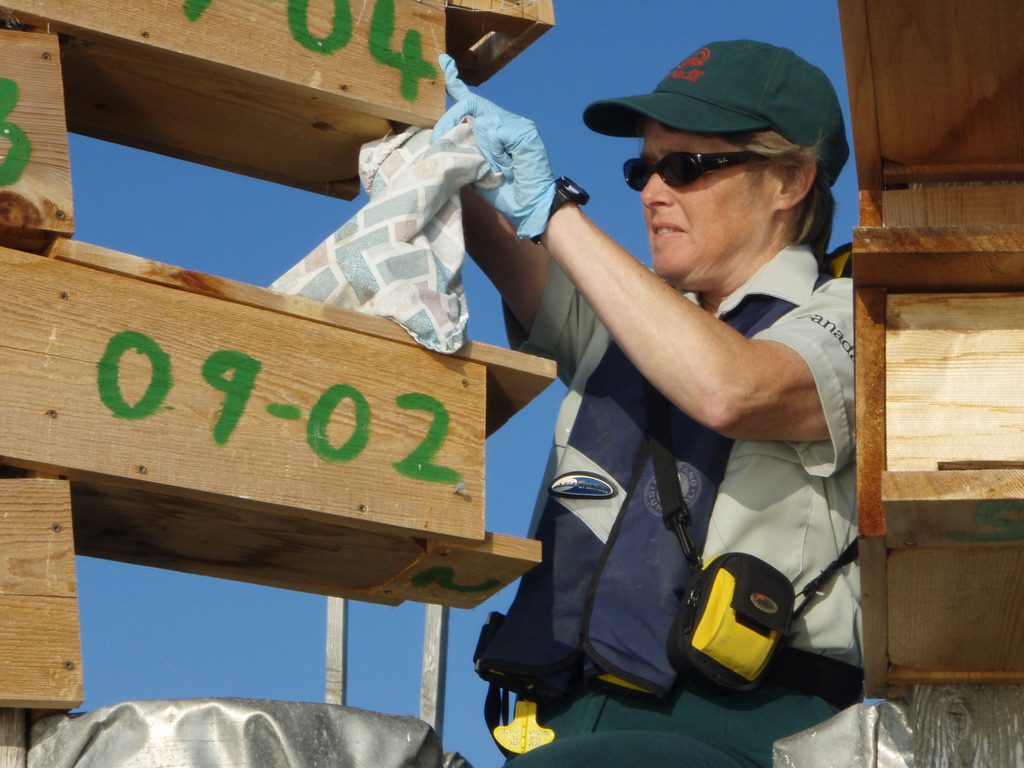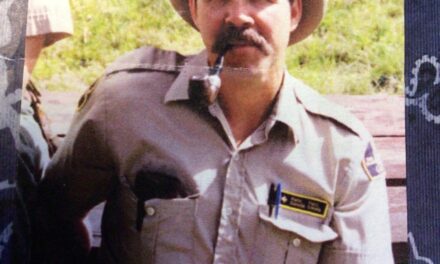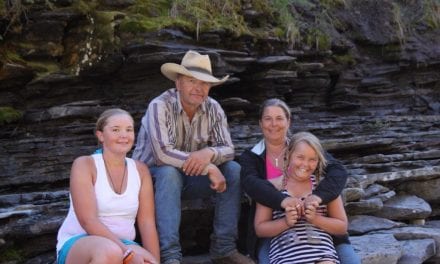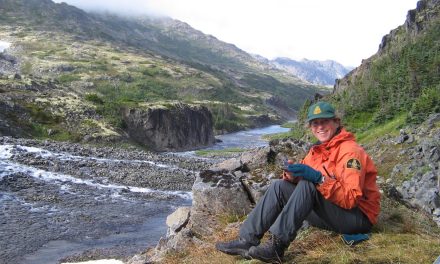5422: One day in Wood Buffalo when I was patrolling the south road towards Pine Lake, I remember seeing a piece of flagging tape that went into a buffalo wallow and thought, “That’s strange.” As I checked out the area, I could smell something dead and was thinking, “Okay, what am I going to find?” So I started looking around, following my nose I smelt something pretty ripe, then I saw a gut pile, bingo – but when I looked up, about five feet in front of me was a bear. My heart was in my throat until I realized it was the head of a bear hanging in the tree at eye level. In Cree culture when you harvest an animal, it’s respectful to hang a portion of that animal in the tree. I learned my lesson, don’t go looking in the woods with your head down. Gee’s my heart was beating fast that day!
5810: Ahh there are so many memories working as a Warden. In the North, we used to go to a little community called Garden River, which in the wintertime, you would drive an hour and a half down to Peace Point, then you’d offload the Skidoos and spend the next four hours on Skidoo getting to Garden River, on a trapper trail. I could never decide whether it was better to go first or second when we got to the river crossings. There were a number of river crossings, which could be very challenging because one never knew how much overflow there might be. As ice freezes on a river it gets heavy and sinks allowing water (six inches to a foot) to flow over the top. It will form a crust but may not get very thick especially if you have a layer of snow over top. In the north, you really don’t want to have wet feet when you’ve got another two hours or so of Skidooing to do. So I could never decide, go first and find out there’s overflow or go second and know there’s overflow when you see the rooster tail of water shooting out behind the person in front. Either way it’s feet up, feet up, and “Please don’t stall going up the bank on the other side because you do not want to get your feet wet.” Never a dull moment, you got good at problem solving, which is always a good thing.
MH: How did the Warden Service change over the years? 10145:
JM: The big change of course was when they went to being armed and only Law Enforcement folks were considered Park Wardens, while everyone else was Resource Management Officers, or whatever. When I first started in the Warden Service, it was already on the trajectory of having more science capacity. I think that was a really good thing and it served us well. The specialization can work well in larger Parks like the Mountain Parks, but in the smaller Parks, when you only have X number of people, it’s not always so practical. I’ll give you an example, here in the Gulf Islands, the Law Enforcement guys have somewhat dedicated boats, the rest of us were all sharing and scrambling for boats. If you have a Public Safety incident, and the Law Enforcement person is the closest to that location, if they could they would respond. There’ve been times when they responded only to get chastised by their supervisors in Regional/National Office saying, “That’s not your role, you shouldn’t be responding.” But reality check, you’re the closest person and it makes sense for you to respond. You’re not going to sit there and say, “No, sorry, I can’t respond because that’s not my job.” There’s definitely pros and cons to the way things have evolved. That is an example of a con, when people from outside the organization who aren’t as familiar with the traditional roles, or the practicality of working in smaller remote offices have unrealistic expectations of field staff. On the flip side the specialization provides a higher level of service. But you can’t lose sight of the fact that smaller field units often need support from other people and managers have to be willing to allow staff to have a capacity level to provide that support. I think the increase in the number of women in the Warden Service has been a good thing.
MH: What about the Warden Service was important to you? 1:15:20:
JM: What was important to me was the protection and preservation element, but also being able to do the resource work which gave us the knowledge and understanding of what was actually happening in the park and figuring out where we should be putting our focus. It’s interesting, when we were, I know, I keep going back to Wood Buffalo but there were so many diverse and complicated issues up there. Coming from the South, hunting and trapping wasn’t allowed in southern Parks at the time and then we moved North where it was. For many Wardens from the South, it was hard to accept that it should be allowed. But you’ve got a piece of property bigger than Vancouver Island and these are people who traditionally hunted and trapped in the Park. When we were in Wood Buffalo, the majority of trappers were 40 plus years old and it was a way of life for them. I remember, we had a post-doctorate come and work with us for a while and he was adamant that we should start small mammal surveys to find out what impacts trapping was having on them. I said it wasn’t an issue because this was their livelihood and that they we’re not going to eliminate it. The local trappers knew more about what they have in their trapping areas than you and I would ever know, from doing some surveys. This was before the value of traditional/ cultural knowledge was considered valid. I saw our relationship with First Nations evolve over the time we were there, and believe that while challenging, working together with the different nations on management issues was a good thing.
MH: Are there any legendary characters or stories associated with the Warden Service that you can share? 1:26:00:
JM: You know, I thought about that a lot. Were there people that you might want to work with more than others? Absolutely. But in terms of legendary, the Warden Service to me, it wasn’t a place for legends, it was a place to work together, to work as a team. Each person had different strengths. There were great people that I had the good fortune of working and learning from, but would I call them Legends? No, not really. I would call them really good Wardens. I can’t put someone on a pedestal over someone else, everyone brought different strengths and were so good for different reasons. Yeah, I guess that would be my response.
MH: Is there anyone from the Service that stands out in your mind? 1:28:26
JM: George Sinclair, he was the Wes Bradford equivalent in the East Coast, an all-around capable, humble person. Roger Baird, Oh, my God, such a solid Warden. You know, another person is Mac Savoy. He was a veteran hired on the veteran preference program. In the Warden Service there seemed to be two types of people: the ones that want to make it hard for you because it was hard for them and that’s how you learn; or those that hated how hard it was so why not provide advice and help folks along. Mac was the latter type, a neat character, who would let you try to figure things but if he thought you were headed in the wrong direction would provide some sage comment to help you get back on track.
MH: Is there anything about the Warden Service, as you knew it, that you would like future generations to know?
JM: It’s very easy to look back and think about it from a kind of romantic perspective. For sure it was a good job and the diversity was really great, but it’s hard to be good at everything. When I think about smaller Parks, trying to maintain all the elements of the job at a professional level be it: public safety and rescue, fire management, resource conservation, and law enforcement, it was a challenge. I know a lot of people may not like the way things have gone, but in many ways, it probably is good to have specializations be it law enforcement, fire, science or public safety. If we want to be a professional organization, we need to have professional staff.
MH: What made the Warden Service such a unique organization? 136:05
JM: It was such a unique organization because it felt like a big family, you know each other’s kids and looked out for them, and because the work was so diverse, you never knew what you’d be doing next. In small parks and regions you got to know everyone, if you were traveling, you knew you could always stop and visit and have a place to stay. I think that’s one of the things we miss the most, the connectedness, and always having friends to do trips with.
MH: Do you have any lasting memories as a Warden? 1:37:20
JM: I shared that one with you earlier, the one in Wood Buffalo with the bison is probably one of my all-time favorite memories, it still gives me chills.
MH: Do you ever miss being a Warden?
JM: Oh, yeah, absolutely. I miss the camaraderie and support and knowing that you have a place to stay no matter what. When we worked in Jasper, we lived outside of the Park, people coming through from the north would all land at our place. In Wood Buffalo, if people were coming up from Fort Chip, many would stay at our place. In the Gulf Islands, we tell the folks living out on the islands, anytime you can’t get home because the ferries aren’t running, or you get back late and you’re tired, you’re more than welcome to stay anytime. The open door policy, I always felt within the Warden Service (and Parks in general), you always knew when people said it, they meant it.

Banding Purple Marten on the Sidney Island, Gulf Islands National Park Reserve
MH: Do you have any photos of yourself as a warden that you would like to donate? Artifacts? 1:39:45
JM: I’ll go through and see what I can find. I’ve never been great at taking photos, I’ve always been busy doing.
MH: What year did you retire?
JM: 2018 and then I promptly spent the winter working in Jasper. It was one of those five week things that lasted for five months, it was really wonderful to be back in my old Environmental Assessment job, and it’s a great team of people to work with.
MH: What do you enjoy doing in retirement? 1:43:15
JM: Hiking, biking canoeing, boat tripping, bike tripping, skiing.
MH: Is there anything I haven’t asked you that you think I should know about the Warden Service? No
MH: Anyone else to interview?
JM: Interviewing some of the Wardens from Kouchibouguac would be very interesting and a different perspective.
Michelle Savoi or Noel Fontaine – both in Kouchibouguac. Roger Baird, I think George gave you him and Barb Linehan, George Sinclair, Murray Peterson, Alan Gibbs.
MH: Any final comments?
JM: There used to be a lot of movement between parks and regions, it’s too bad it doesn’t happen as much know, I know it’s a cost issue. I think it was a really good thing for the people and parks, a great way to grow experience in the organization and broaden perspectives.
This interview was conducted by Monique Hunkeler
Monique Hunkeler first started working with Parks Canada in 1989 as Secretary to Banff National Park Finance Manager. She moved into a position as Dispatcher for the Banff Park Warden Service and later worked within Banff National Park and Town of Banff’s IT departments. She is experienced with the interviewing, transcription and archiving process the Park Warden Service Alumni Society.



